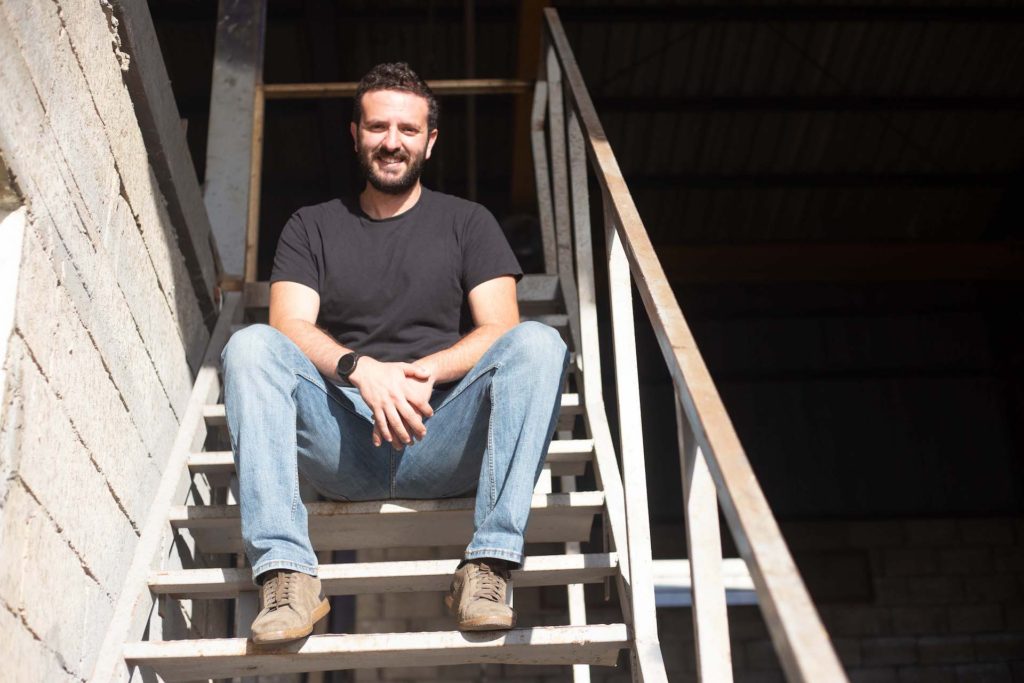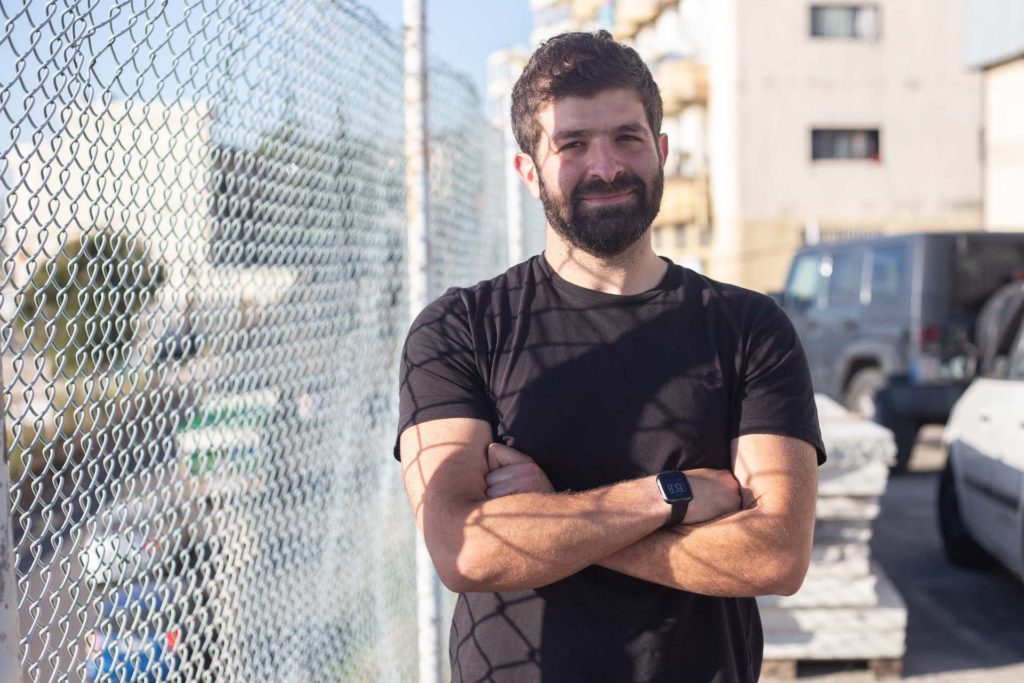Brothers Rami and Ralph Sbeih created Plastc Lab in 2020. Their goal is to turn the plastic waste that is inundating Lebanon into a useful resource for the country, and ideally, expand internationally.
Rami Sbeih, 33, biochemist

“In 2019, a Belgian friend told me about Precious Plastic, an organization that is fighting for plastic recycling around the world. As a biochemist, I’m interested in materials, but I didn’t know anything about plastic recycling. I immediately loved the idea of turning waste into a precious resource. It’s a significant paradigm shift; it truly impressed me. For a year, I scoured the web for information, I watched hundreds of videos, it felt like a new world was unraveling in front of me. I took part in a workshop in the Netherlands with a team from Precious Plastic. I realized that beyond their initiative, there was a global movement for recycling. This was what pushed Ralph and I to go on this journey.
In Lebanon, since 2015, we talk a lot about recycling, gathering plastic, and waste management, but these are just empty words. This country never established a sustainable initiative to fight this crisis. Waste always finds its way into vacant lots and the sea, it’s outrageous. We launched Plastc Lab one year ago, and apparently we do have an opportunity to shake things up in our country. It’s very exciting!
Just like all our previous projects, Plastc Lab was born in our family home, in the mountains. So you can imagine the reaction of our parents when they saw the huge stack of plastic piling up in our garden…Luckily for them, since the beginning of May, we moved to a big warehouse of 1500 m2, in Halat. What surprised us most is that those who brought the most plastic were friends and family when we thought that only the younger generation cares about recycling. It encouraged us a lot, it’s a sign that mentalities can shift.
The meeting with Berytech and makesense through Omdi, who support our project, was decisive. They opened our eyes to the huge economic potential of Plastc Lab in Lebanon, especially with the devaluation : plastic will become the people’s preferred option when glass and wood will become unaffordable.
Omdi also creates a synergy with the other companies, and this strengthens our approach. We are thrilled to have a booming project, and to open bank accounts in the middle of an economic crisis!
Our friends think we’re crazy, most of them have left the country in the beginning of the crisis. We want to believe that it’s still possible to launch a new business here. Our company is just getting started, but we are ambitious. In six months, we will be able to manage ten tons of plastic per month, and we will increase this amount as we upgrade our machines.
We will start by hiring 5 to 6 employees. We will partner with designers and interior architects who will create chairs, tables, and any other object 100 % made of our recycled plastic.
We are also closely collaborating with the Lebanese startup Modeo System. This startup allows its users to create furniture through its mobile application, then deliver it to them in kits, just like IKEA. They are very interested in the advantages of plastic because it has become impossible nowadays to find wood at affordable prices. They are also fixing the houses that were destroyed in the Beirut Blast. They could use our plastic to do so.
Last but not least, only a third of our warehouse in Halat will be used for production. The rest will be devoted to workshop spaces, to raise awareness about the plastic waste crisis among the public. Lebanon is our pilot project, but we wish to expand internationally, in the Gulf region or in Europe, three years from now.”
Ralph Sbeih, 31, civil engineer

“It’s the fourth project that we work on together as brothers. At 20 years old, Rami was 22, we opened our first pub in Jounieh, it lasted 4 years, then we opened a small nightclub, two football fields, and a fries kiosk too ! We made mistakes, but all these experiences taught us how to work together, we complement each other. So when Rami came back home one day and told me about the recycling project, I listened carefully.
In the beginning I was a bit skeptical, Lebanon was on the verge of collapsing, it didn’t seem to me like it was the best time to launch a new project. But when we asked around, we realized that the market actually needed such a project.
I am a civil engineer, but I’ve been studying sustainable development for a year now. In Lebanon, many organizations work in waste management, but none are specialized in plastic recycling. They just re-sell it to foreign companies. We want to establish a virtuous cycle where plastic is gathered, recycled, and re-used in Lebanon.
We are working to make 2m by 1m plastic plates for the construction sector to replace the wooden plates used as frames for cement. This alternative has a double advantage : it’s reusable and less expensive. We will also give the constructor the option to return the plates after they use them ; we will recycle them and sell them again at a discounted price.
Waste management is one of the symbols of corruption in Lebanon. We have witnessed how the private companies responsible for waste collecting since the 2015 trash crisis have been negligent. This crisis was our wake up call. Sadly, we believe that it will happen again. If it does, we hope that our company will be ready to play an important part between the ruling class and the civil society.
Through Plastc Lab, we want to prove that it is possible to go against a corrupted system, to fill a void that the government neglected in the society, and turn it into a profitable business. 20 % of the country’s waste is made of plastic, and no one is recycling it. We have been discussing our project with different municipalities in Kesrouane. All of them are very interested in our project, but no deal has been made yet. Cities are contractually obligated to work with companies like Ramco to manage their waste, so we are currently finding a legal way to work with them without going through the usual processes.”
Omdi is a program financed by the French Institute of Lebanon and the French Embassy, in partnership with makesense incubator. It supports 15 projects made by young people in Lebanon that aim to solve a social and environmental problem.
#GSC this post is sponsored by Omdi
